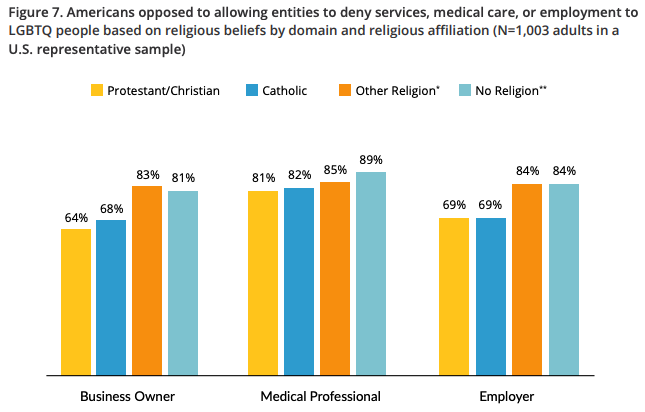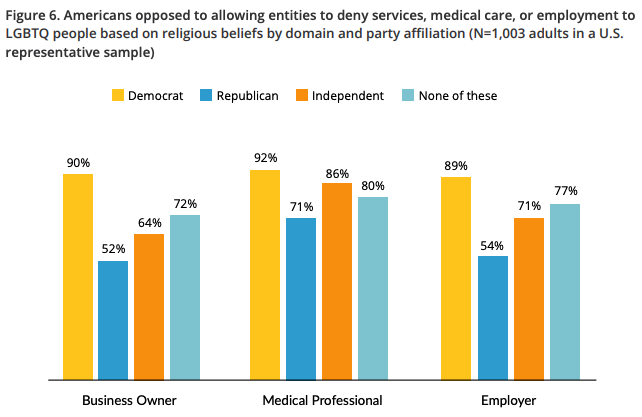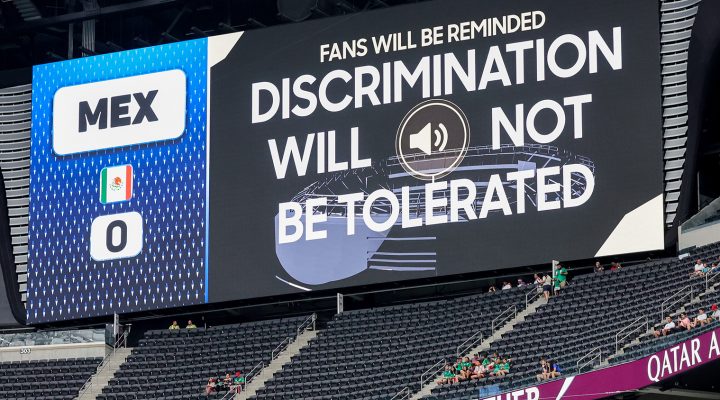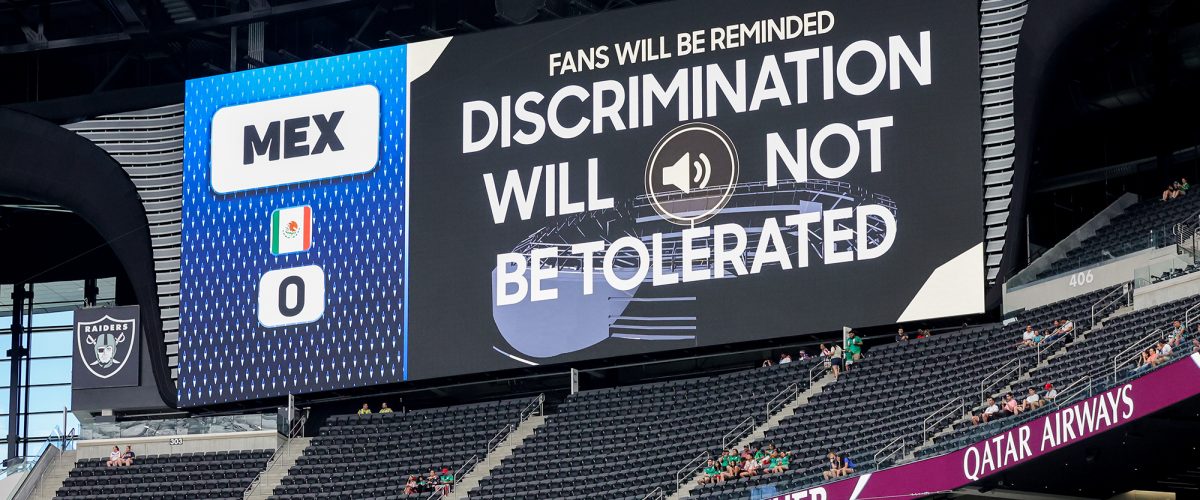A majority of Americans oppose using religious beliefs to deny employment, medical care and business services to LGBTQ people, a new survey shows.
The study even found most religiously active people disprove of such discrimination based on sexual preference or gender identity, according to researchers at the University of Chicago’s National Opinion Research Center and the Williams Institute at the UCLA School of Law.
“Notably, a large percentage of religious adults opposed discrimination based on religious beliefs: 59% of people who frequently attended religious services opposed denying employment to LGBTQ people based on religious beliefs. A large majority of all religiously affiliated respondents opposed denying services, medical care and employment to LGBTQ people, including about two-thirds of individuals who identify as Catholic or Protestant/Christian,” researchers said.
Opposition to religiously motivated discrimination was especially strong across the overall U.S. population, according to the survey released June 15. “Specifically, 84% of respondents opposed allowing medical professionals to withhold care from an LGBTQ person based on religious beliefs; 74% of respondents opposed allowing employers to discriminate against LGBTQ people based on religious beliefs; and 71% opposed allowing businesses to deny service to LGBTQ people based on religious beliefs.”
The study, “Public Attitudes Toward the Use of Religious Beliefs Against LGBTQ People,” coincides with increasing popular support for LGBTQ rights. Researchers noted the approval rating for marriage equality in the U.S. has grown from about 30% to 70% over the past two decades.
But that groundswell has been met with legal and political determination to quash the advancement of LGBTQ rights.
“Despite growing public support, legislatures have increasingly considered bills to restrict LGBTQ rights, and courts have been asked to narrow the scope of existing protections,” researchers noted.
Some of those suits were brought by business owners who cited religious beliefs to deny wedding-related services to gay and lesbian couples.
“For example, a flower shop in Washington refused to sell flowers to a same-sex couple for their wedding, a videography business in Minnesota sought to create wedding videos only for different-sex couples, and a bakery in Colorado refused to sell a wedding cake to a same-sex couple.”
The latter case, Masterpiece Cakeshop v. Colorado Civil Rights Commission, ended with a 2018 U.S. Supreme ruling in favor of the baker. The web design case, 303 Creative v. Elenis, is pending before the high court.
Legislative efforts to permit LGBTQ discrimination based on religion, including bills allowing certain categories of businesses to cite faith in denying services to LGBTQ customers, have proliferated in recent years, the researchers added.
“The most common form of these laws specifically allows child welfare service providers to refuse to provide services to LGBTQ people based on their religious beliefs (13 states). In addition, nine states have laws that allow medical professionals to decline to serve LGBTQ people based on religious beliefs, and two states have laws that allow private businesses to deny wedding-related services to same-sex couples. One state, Mississippi, has a broad law that also allows employers and landlords or other housing providers to discriminate against LGBTQ people based on religious beliefs.”

Opposition to such laws was found to be strong across demographic groups, although with notable disparities in some cases.
“Women were more likely than men to oppose the use of religious beliefs to deny business services, medical care and employment to LGBTQ people. However, over two-thirds of men opposed the use of religious beliefs to discriminate against LGBTQ people.”
Majorities of ethnic and racial groups also expressed opposition to denying medical care, business services or employment to LGBTQ people. “In terms of medical care, there was no significant difference in opposition by race/ethnicity.”
However, the survey identified a disparity between people of color and whites on these questions.
While more than 80% of Black respondents opposed the use of religious beliefs to discriminate against LGBTQ people, white respondents” were the least likely to oppose the use of religious beliefs to deny business services (68%) and employment (71%) compared to people of other races and ethnicities.”
The survey also detected a significant connection between partisan identity and attitudes about the discrimination of LGBTQ people. Even so, a majority of Democrats, Republicans and independents still opposed using religion to deny medical care, employment and business services based on sexual preference or gender identity.

While a majority of Republicans oppose denial of services, the gaps between Republicans and Democrats remains huge.
While 92% of Democrats oppose using religious beliefs to discriminate on medical care, only 71% of Republicans share that view. And while 89% of Democrats oppose discrimination on employment, barely half (54%) of Republicans share that view.
Another differential is whether a person knows someone in the LGBTQ community.
“Knowing someone who is LGBTQ and the closeness of the relationship were related to the level of opposition to the use of religious beliefs to deny services, medical care and employment,” researchers said.
The matters of discrimination asked about in this survey mirror some of the key issues of the Equality Act, a bill that has stalled in Congress in recent years. That bill would make it illegal to discriminate based on sexual orientation in employment, housing, credit, education, use of public spaces and services, federally funded programs and jury service.
The bill passed the Democratic-controlled House of Representatives in 2021 but never made it out of the Senate, where Republicans had enough leverage to block it. It has not been re-introduced in the current legislative session.
Related articles:
American support for Equality Act ideals still growing, new polling shows
Equality Act stirs passions about the definition of religious liberty and RFRA’s role


